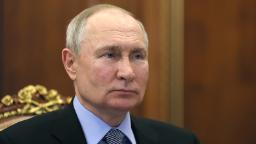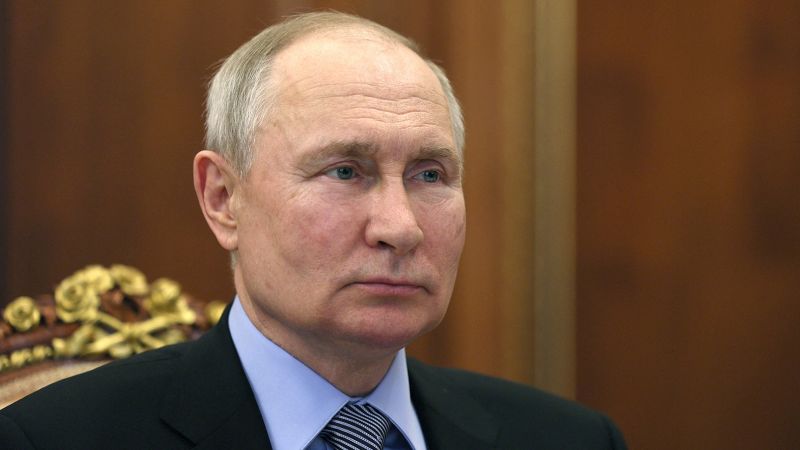
CNN
—
The world just got a hint of a tantalizing but possibly even more dangerous future without Russian President Vladimir Putin. The Western stakes in the Ukraine war rose significantly as a result.
A mutinous weekend that saw mercenary chief Yevgeny Prigozhin flagrantly mock the Kremlin before aborting his march on Moscow evoked Russia’s blood-soaked history of revolutions and coups. Meanwhile, efforts by the White House and its foreign allies to find out exactly what was happening underlined the volatile nature of a war that could rewrite the map of Europe and modern history. Ultimately, a civil war that seemed about to burst out was averted – at least for now.
The Kremlin strongman seemed to blink at a military confrontation with Prigozhin’s Wagner Group fighters – in an act that might preserve his grip on power. But Prigozhin’s defiance – and the retreat by Putin, who accused him of treason but then agreed to a deal to let him apparently escape to exile in Belarus hours later – punched the deepest holes in the Russian president’s authority in a generation in power. There’s now no doubt that the war Putin unleashed to wipe Ukraine off the map poses an existential threat to his political survival. The rest of the world must now deal with the implications.
“This is not a 24-hour blip. It’s like Prigozhin is the person who looked behind the screen at the Wizard of Oz and saw the great and terrible Oz was just this little frightened man,” former US ambassador to Ukraine John Herbst told CNN’s Christiane Amanpour. “Putin has been diminished for all time by this affair.”
Schisms in Moscow and between the government and Prigozhin’s Wagner Group – the only Russian fighting force that has enjoyed much recent battlefield success – might also now conjure an opening for Ukraine, which wants breakthroughs against Moscow’s already demoralized and poorly led troops in its new counteroffensive. This would be good news for the West, which has bankrolled and armed the country’s fight for its life. And there’s no doubt that NATO leaders would love to see Putin gone since there’s no sign he will end the war by pulling his troops out of Ukraine.
For a time, it appeared that a teetering autocrat, Russia’s military and rival militia chiefs might end up in a civil war for control of a nation with a vast nuclear arsenal. Such instability and internal strife in Russia would send geopolitical shockwaves across the globe.
The West truly doesn’t have a side in the internal strife that erupted this weekend. This was a showdown between Prigozhin – whose men are accused of brutal human rights abuses in Ukraine, Syria and Africa – and Putin, who has revived World War II-style horror in Europe, who flouted international law by invading a sovereign neighbor and who faces an arrest warrant for alleged war crimes. Prigozhin also has been no friend to the US – he has admitted to interfering in American elections and pledged to do so again.
Statements by Western leaders that this was an internal Russian matter reflected a desire to deny Putin a pretext to renew his claims that he’s a victim of a Western plot to overthrow him and suppress Russia’s dignity as a major power and to trim its geopolitical sphere of influence. CNN’s Kevin Liptak reported that in telephone conversations with the leaders of France, Britain and Germany, Biden stressed the need to keep the temperature low and to allow whatever was happening in Russia to play out in keeping with his mantra to prevent “World War III.”
And while it’s possible a crack in the Putin regime could presage an eventual collapse that might remove one of Washington’s major foreign policy challenges – a new Cold War-style standoff with Russia – no one in Washington is betting on it.
“I don’t think we want a country that spans 11 time zones and includes republics in the Russian Federation of many different ethnic and sectarian groupings to come apart at the seams,” retired Gen. David Petraeus said on CNN’s “State of the Union.”
“Is this the beginning of the end of Putin? We don’t know. Whoever follows him, if that is the case, will he be even more dictatorial, which is what we feared might be the case if Prigozhin may have been successful? Could there actually be a pragmatic leader who steps in and realizes what a catastrophic error this whole Ukraine endeavor has been and realize that they need to somehow get a more rational approach to Europe and to the West?” asked Petraeus, a former CIA director.
“Many, many unknowns.”
It has long been clear that Ukrainian success in this war could pose a serious political threat to Putin’s rule. But it’s one thing to posit this in theory. After this weekend, this new reality will require the West to once again examine its balancing act to save Ukraine.
It’s possible that the Russian leader’s humiliation could cause him to demand an even more vicious push in a war that has already callously targeted Ukrainian civilians. If political strife in Russia further damages its troops’ morale and leads to battlefield losses, Putin’s position could become even more difficult. This will fuel fears that the Russian leader could threaten a catastrophic escalation of the war after months of nuclear saber rattling.
And if the weekend was a preview of a possible collapse of the Putin regime, if the war keeps going from terrible to worse for Russia, the West could have another headache.
After months of heavy losses on the battlefield and economic pain at home caused by Western sanctions, it was noticeable that the most potent resistance to Putin came not from a democratic movement that he spent years crushing. It was from a force even more right-wing and brutal than him – Prigozhin. And another extreme and bloodthirsty war lord, Chechen leader Ramzan Kadyrov, offered on Saturday to help suppress the Wagner rebellion on Putin’s behalf, which is one reason why there were fears of a bloodbath on the streets of Moscow.
Behind-the-scenes machinations of Moscow’s politics – a bear pit populated by thuggish militia chiefs, intelligence chieftains and oligarchs – are impossible to predict. But the weekend’s wild twists highlight the possibility that whoever leads Russia after Putin may be even more ruthless and hard for the West to deal with as its longtime nemesis. One of Prigozhin’s pet projects, for instance, was the Internet Research Agency, a troll farm used by Russia to send a torrent of misinformation across social media in an effort to interfere in the 2016 presidential election.
“We’re all maybe excited to see that Putin’s hold on power is shakier and the state is more fragile than we thought, but we should also think as much about what would happen next,” said Robert English, an expert in Russia and eastern Europe who directs the School of International Relations at the University of Southern California.
“It probably will be somebody like a Prigozhin or another sort of military leader who pretends for power, not a liberal like an Alexei Navalny or these other liberal critics of Putin, but a populist from the right who appeals to the same anti-elite, anti-corrupt instincts but has brutal dictatorial tendencies of their own,” English said.
The assumption in Washington is that the hastily announced truce brokered by Belarusian President Alexander Lukashenko, which led to Prigozhin halting his advance on Moscow, is far from the end of the story. “It’s too soon to tell exactly where this is going to go,” Secretary of State Antony Blinken said on CNN’s “State of the Union” on Sunday. “I suspect that this is a moving picture.”
At the same time, there is a sense that Putin – whose rule has long relied on his ability to keep various factions below him placated – has seen his credibility as a leader seriously wounded.
Blinken said that the fact that a strong figure inside Russia had questioned Putin’s authority directly was “something very, very powerful.” He added: “It adds cracks, where those go, when they get there, too soon to say, but it clearly raises new questions that Putin has to deal with.”
The possibility that a weakened Putin could seek more extreme ways to turn around a war that is threatening his hold on power is likely to preoccupy the US and its allies. Biden has been adamant about the need to avoid the conflict spilling over into a direct Russia-NATO conflict. But the fact that the war is now causing deep splits inside Russia in a way that could affect the integrity of its operations may be an argument for quickly escalating western help to Ukraine.
Putin’s apparent vulnerability is likely to embolden those who argue that Biden has been too timid, despite reviving the Western alliance to help Ukraine defend itself in the most sweeping transatlantic mobilization since the end of the Cold War and sending billions of dollars and advanced weapons. Critics complain that the West has given Ukraine enough to survive but not to expel Russian troops from all of its territory and even Crimea, which Putin illegally annexed in 2014.
Republican presidential candidate Will Hurd, a former CIA officer and Texas congressman, said Sunday that statements from the US and its allies that they were monitoring events in Russia sent a weak message to Putin. “There’s another word for that. That’s wringing your hands and doing nothing,” Hurd said. After intelligence reports suggesting potential action by Prigozhin, “we should have been planning with our allies, we should have been planning with the Ukrainians on how to take advantage of this opportunity,” Hurd said on ABC’s “This Week” on Sunday.
Hurd – one of the handful of candidates to anchor his campaign to directly attacking the GOP frontrunner, former President Donald Trump – has only recently jumped into the presidential race. But his comments reflect the reality that while Biden’s premier responsibility is the foreign policy implications of the war in Ukraine, he must begin to consider the conflict’s implications for his political prospects.
Any worsening of already dire US relations with Moscow – or incidents that bring US and Russian forces into conflict – are likely to play into the hands of Republicans, especially Trump, who is warning that Biden’s support for Ukraine could cause World War III.
Trump’s claims that he could end the conflict in 24 hours are fatuous, and any solution he does propose is likely to benefit Putin, whom he has long admired. But while the war in Ukraine already dominates Biden’s legacy, a Russian collapse that leads to global chaos is unlikely to help him politically as an election year approaches.

